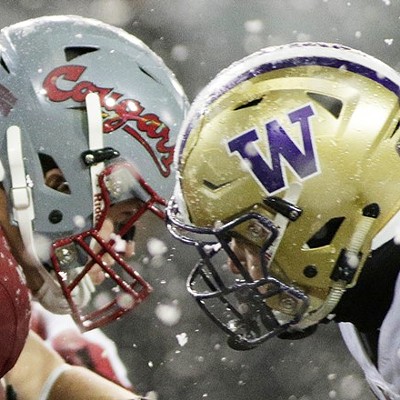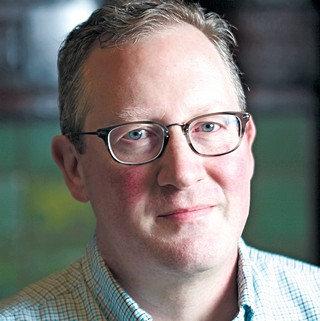State Of Emergency 01/20/97
[
{
"name": "Broadstreet - Instory",
"insertPoint": "5",
"component": "25846487",
"requiredCountToDisplay": "5"
},{
"name": "Broadstreet - Instory",
"insertPoint": "10",
"component": "25846487",
"requiredCountToDisplay": "10"
},{
"name": "Broadstreet - Instory",
"insertPoint": "15",
"component": "25846487",
"requiredCountToDisplay": "15"
},{
"name": "Broadstreet - Instory",
"insertPoint": "20",
"component": "25846487",
"requiredCountToDisplay": "20"
}
]
Commentary by Ted S. McGregor Jr.
Spokane City Council members are breathing easier since voting to back the public-private partnership with River Park Square's developers. It's hard to remember a council under more pressure than this one: if they didn't support it, they ran the risk of being blamed for the fall of Western civilization. So it's easy to understand how eager they were to put the ball back in the developers' court. What remains puzzling is how the handling of the project became a state of emergency in the first place.
While watching the public testimony leading up to Monday night's vote, the depth of emotion and level of understanding of these extremely complex issues was striking -- a marketplace literally bubbling over with ideas. But it was wasted energy, as the chance for a public vote was rejected by calling the matter an "emergency. "
There are defensible reasons for this "emergency " designation, but any governing body must know that it messes with Americans' right to vote at its own peril.
One thing that was mentioned during the testimony was that downtown -- the city's heart and soul -- is in a fragile state and must be handled accordingly. I submit that the city's political heart and soul is equally fragile, yet while the River Park Square proposal is handled with the care, the need to bring people together to maintain a united heart and soul is not.
When people talk about downtown, you hear a lot of excitement and there is a lot of common ground; it's obvious that no other issue has the potential to bring Spokane citizens together the way downtown could. Yet in the aftermath of the council's endorsement of the project, lawsuits, hard feelings and division take the edge off the celebration. Many residents are happy and excited about the project, but too many aren't. It's too bad, because it didn't have to be that way.
This is not a comment about the merits of the project or downtown's future; it's a question of whether the city will proceed with a single, confident purpose in facing all its challenges or as "us and them, " mistrustfully placed at cross purposes, sometimes out of no more than spite, stumbling from lawsuit to lawsuit and from crisis to crisis, stifling progress and success rather than inspiring it.
The sad thing about the council's decision to call the ordinance an "emergency " is that everyone knows that a two-year-old project never had to become an emergency. In fact, if it had been handled differently, it could have served to bring the community together and create an even brighter outlook for downtown.
Imagine this scenario: In 1995, when the developers and the city announce the project, they finish the press conference with "and we think this is such an important project and such a great idea that we will put the city's involvement to a public vote. " With a little bit of planning, such a vote could have been held last November.
This approach would have removed all questions about whether the project was greased from the start. And it would have ultimately resulted in a project that would be better accepted by the shopping public. It's worth noting that oft-quoted public-private partnerships in other cities share something Spokane's doesn't: a public vote of endorsement.
The downside to democracy? What if the naysayers vote it down? That's the risk, but that's what it usually takes to get at public money. Not here, it turns out. Most people think the project would have passed a vote anyway, and who can say that the debate and sense of closure that comes with a vote wouldn't be good for this city?
It's obvious that this project has come to represent much more than just a mall; it's become a test of who we are. If this project succeeds, the feeling goes, there'll be no stopping Spokane... except for Spokane itself, an all too familiar story. Lawsuits, de facto boycotts and, worst of all, apathy are the price of political exclusion.
It's a wistful thought and probably naive as hell, but I can't help but think that a city government set on unity rather than expedience could have turned this project into a way to bring people together.
Spokane City Council members are breathing easier since voting to back the public-private partnership with River Park Square's developers. It's hard to remember a council under more pressure than this one: if they didn't support it, they ran the risk of being blamed for the fall of Western civilization. So it's easy to understand how eager they were to put the ball back in the developers' court. What remains puzzling is how the handling of the project became a state of emergency in the first place.
While watching the public testimony leading up to Monday night's vote, the depth of emotion and level of understanding of these extremely complex issues was striking -- a marketplace literally bubbling over with ideas. But it was wasted energy, as the chance for a public vote was rejected by calling the matter an "emergency. "
There are defensible reasons for this "emergency " designation, but any governing body must know that it messes with Americans' right to vote at its own peril.
One thing that was mentioned during the testimony was that downtown -- the city's heart and soul -- is in a fragile state and must be handled accordingly. I submit that the city's political heart and soul is equally fragile, yet while the River Park Square proposal is handled with the care, the need to bring people together to maintain a united heart and soul is not.
When people talk about downtown, you hear a lot of excitement and there is a lot of common ground; it's obvious that no other issue has the potential to bring Spokane citizens together the way downtown could. Yet in the aftermath of the council's endorsement of the project, lawsuits, hard feelings and division take the edge off the celebration. Many residents are happy and excited about the project, but too many aren't. It's too bad, because it didn't have to be that way.
This is not a comment about the merits of the project or downtown's future; it's a question of whether the city will proceed with a single, confident purpose in facing all its challenges or as "us and them, " mistrustfully placed at cross purposes, sometimes out of no more than spite, stumbling from lawsuit to lawsuit and from crisis to crisis, stifling progress and success rather than inspiring it.
The sad thing about the council's decision to call the ordinance an "emergency " is that everyone knows that a two-year-old project never had to become an emergency. In fact, if it had been handled differently, it could have served to bring the community together and create an even brighter outlook for downtown.
Imagine this scenario: In 1995, when the developers and the city announce the project, they finish the press conference with "and we think this is such an important project and such a great idea that we will put the city's involvement to a public vote. " With a little bit of planning, such a vote could have been held last November.
This approach would have removed all questions about whether the project was greased from the start. And it would have ultimately resulted in a project that would be better accepted by the shopping public. It's worth noting that oft-quoted public-private partnerships in other cities share something Spokane's doesn't: a public vote of endorsement.
The downside to democracy? What if the naysayers vote it down? That's the risk, but that's what it usually takes to get at public money. Not here, it turns out. Most people think the project would have passed a vote anyway, and who can say that the debate and sense of closure that comes with a vote wouldn't be good for this city?
It's obvious that this project has come to represent much more than just a mall; it's become a test of who we are. If this project succeeds, the feeling goes, there'll be no stopping Spokane... except for Spokane itself, an all too familiar story. Lawsuits, de facto boycotts and, worst of all, apathy are the price of political exclusion.
It's a wistful thought and probably naive as hell, but I can't help but think that a city government set on unity rather than expedience could have turned this project into a way to bring people together.





















